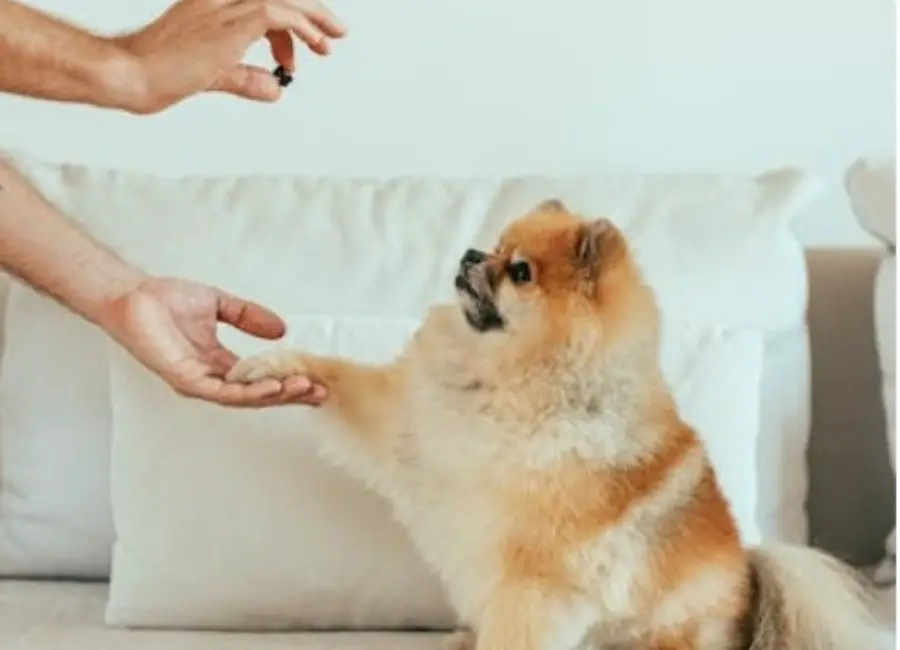Simple Pomeranian Training Tips

This post will provide you with some of the most common Pomeranian training tips you should know when training your Pomeranian.
Training any dog can be time-consuming and require time, consistency, persistence, and patience, especially for small dogs like Pomeranians.
Pomeranians can be a little difficult to train which is why you should take your time and insist on good behavior during training and remember to reward them.
Benefits of training a Pomeranian
Here are some common benefits of training a Pomeranian:
- A Pomeranian dog’s training can enhance your bond with your pet.
- A Pomeranian dog’s obedience and demeanor may be improved through training.
- Your Pomeranian dog’s relationships with other people and animals can be improved with training.
- The general health and physical condition of your Pomeranian dog can be enhanced with training.
- The Pomeranian dogs’ hearing and smelling senses can be improved with training.
- A Pomeranian dog’s temperament and attitude may be improved through training.
- A Pomeranian dog’s quality of life can be enhanced through training.
Pomeranian Training Tips
Here are some common Pomeranian training tips you should know:
- Start training early: It’s crucial to start your Pomeranian’s training as soon as possible, ideally when they’re still pups. They will find it simpler to pick up helpful habits and learn new things as a result.
- Crate training: A crate may be a useful training item for your Pomeranian since it gives them a safe, secure place to sleep and can aid in housebreaking.
- Practice basic obedience commands: Basic obedience commands like “sit,” “stay,” and “come” may be taught to your Pomeranian and are helpful in both ordinary life and more advanced training.
- Leash Training: Leash training is one of the most important Pomeranian training tips you should teach your Pomeranian. Using a leash can help you control your Pomeranian and keep them safe while training or walking.
- Train in short sessions: Instead of attempting to teach your Pomeranian everything at once, it is preferable to divide training into shorter sessions. They will be better able to remember the material and won’t feel overworked or exhausted as a result.
- Use positive reinforcement: Instead of penalizing your Pomeranian for misbehavior, use positive reinforcement by praising them for good conduct. Treats, kudos, and other prizes are examples of this.
- Be consistent: The key to teaching your Pomeranian is consistency. Every time you train, stick to the same orders and methods so your dog knows what to anticipate and can pick up the skills more rapidly.
- Socialize your Pomeranian: Pomeranians benefit from socialization since it may make them more at ease with both humans and animals. Introduce them to a range of experiences by taking them to locations with diverse sights, sounds, and scents.
- Be patient: The process of training a dog may be time-consuming and rewarding. Being sympathetic and patient with your Pomeranian is crucial since they are still learning and making errors. They can need some time to properly grasp and perfect new ideas and habits.
Challenges with Pomeranian training
Stubbornness is one potential problem. Because of their independent and stubborn natures, Pomeranians occasionally struggle to learn new things.
Positive reinforcement strategies, such as rewarding desired actions with sweets or praise, may be useful in overcoming this difficulty.
To assist your Pomeranian to understand their place in the relationship, it may also be useful to create clear limits and position yourself as the pack leader.
Fear is yet another possible obstacle. Training might be more challenging for Pomeranians that are shy or apprehensive.
In order to overcome this difficulty, it’s crucial to provide a happy and encouraging training atmosphere and go at your Pomeranian’s comfortable speed.
Working with a qualified trainer or behaviorist may also be beneficial to assist address any underlying anxiety or fear issues.
Advanced Pomeranian Training Tips
Here are some advanced Pomeranian training tips:
Trick training
Trick training is the practice of teaching a dog a particular habit or action to execute when instructed, usually for amusement or performance.
Dogs may be taught to do a variety of tricks, including rolling over, acting dead, and fetching items.
Trick training may be a fun way to interact with your dog and keep their mind engaged.
It can also be used to reinforce obedience training or to reward good conduct.
Obedience training
Obeying commands and behaving in a way that pleases its owner are the goals of obedience training.
This type of training often aims to make it simpler for the dog to understand and comply with basic cues like “sit,” “stay,” and “come,” as well as more sophisticated cues like “heel,” and “down.”
Obedience training may assist in fostering a sense of order and structure in the home in addition to aiding in the prevention of behavioral problems like barking and jumping up on people.
Potty training
Potty training is the process of teaching a dog to relieve himself outside or in a designated location inside the house.
This process frequently involves using a consistent schedule and prizes to encourage the dog to discharge himself in the right place.
Although it could take some time, toilet training is an important step in creating appropriate hygiene habits and ensuring the dog is well-behaved in the house.
Leash training
Leash training is the process of teaching a dog how to walk appropriately and submissively when attached to a leash.
This type of training frequently focuses on educating the dog to walk by the owner’s side rather than teaching it to lead or trail.
Leash training may be an important part of obedience training when out in public and can help to ensure the safety of both the dog and the owner.
